Iranian Political Prisoner Fatemeh Sepehri’s Health Deteriorates
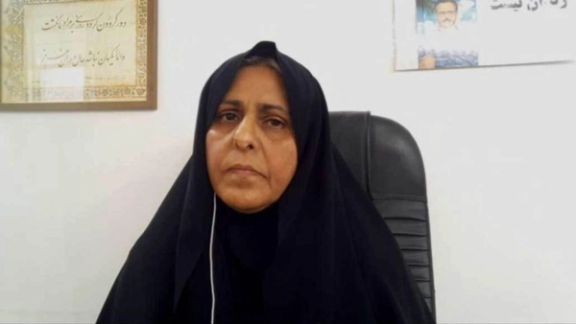
Fatemeh Sepehri, a political prisoner at Vakilabad Prison in Mashhad, is reportedly in critical condition, according to her lawyer, Khosrow Ali-Kordi.

Fatemeh Sepehri, a political prisoner at Vakilabad Prison in Mashhad, is reportedly in critical condition, according to her lawyer, Khosrow Ali-Kordi.
Ali-Kordi warned, "Due to an elevated heart rate, my client can hardly speak, and her respiratory condition is a serious concern."
In a social media video, Sepehri's brother, Asghar Sepehri, revealed, "In Tuesday's meeting, my sister's heart rate was so high that speaking was difficult for her."
The family holds the Supreme Leader of the Islamic Republic responsible for the imprisonment of Sepehri, as emphasized by her mother in the video, stating that if anything happens to her, Ali Khamenei would be accountable.
Imprisoned since September 21, 2022 amid the Women, Life, Freedom protests, Sepehri faces severe charges, including "collaboration with hostile countries" resulting in a 10-year sentence, "conspiracy and collusion" leading to five years of imprisonment, "insulting the leadership" resulting in two years of imprisonment, and "propaganda against the system" leading to one year of imprisonment.
Despite a brief release in October 2022 for medical treatment, Sepehri was re-arrested three days later at her home in Mashhad by security forces.
She is the latest in a long line of prisoners such as rapper Toomaj Salehi and Nobel Laureate Narges Mohammadi, whose lives remain threatened in the confines of Iranian prisons.
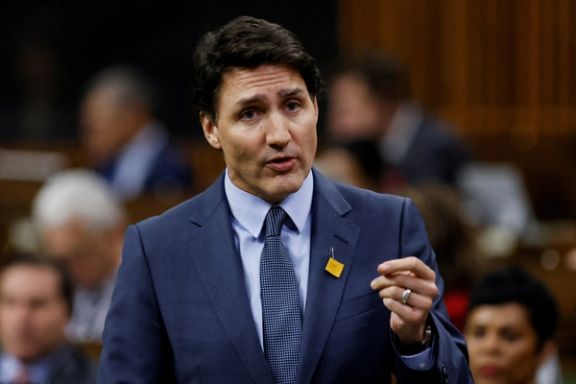
Canadian Prime Minister Justin Trudeau addressed concerns about the impact of Iran's Revolutionary Guard Corps (IRGC) during a speech on Wednesday.
While he refrained from directly answering Iranian journalist Negar Mojtahedi's questions whether Canada would consider listing the IRGC as a terrorist entity, Trudeau emphasized the government's commitment to monitoring and taking responsible measures against the IRGC's influence.
In response to questions regarding the more than 700 Iranian regime-linked individuals reportedly living freely in Canada, Trudeau stated, "We continue to watch and make sure that we're able to do everything we can that is responsible against the impact of the IRGC." However, he did not explicitly commit to designating the IRGC as a terrorist organization.
Trudeau asserted that Canada would persist in holding the Iranian regime accountable, limiting its global impact, and protecting Canadians. He highlighted the ongoing efforts of security services and police agencies to ensure the safety of Canadians.
The Prime Minister's remarks come against the backdrop of increased scrutiny on the IRGC following the downing of the PS752 Ukrainian passenger airliner in January 2020, resulting in the loss of Canadian lives. Despite calls from the Iranian Canadian community, Trudeau has not committed to labeling the IRGC as a terrorist group, citing factors such as mandatory military service that compel some Iranians to join the organization.
Critics argue that existing measures, including expanded sanctions and amendments to the Magnitsky legislation, are insufficient to address the issue of regime-connected officials residing in Canada. The debate surrounding the designation of the IRGC continues, with members of the diaspora expressing concerns about accountability for crimes committed abroad by those holding Canadian citizenship.
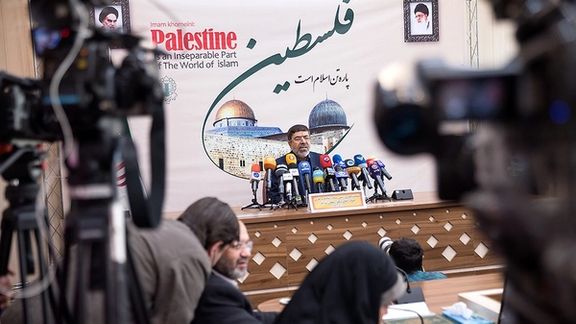
Contradicting a statement from the IRGC spokesman, its top commander, Hossein Salami, denied Iran's involvement in Hamas's October 7 invasion of Israel.
“The al-Aqsa Flood operation was completely a Palestinian operation. It was designed and implemented by Palestinians and no decision was made outside of Palestine,” stressed IRGC Commander, Salami, speaking during the funeral service for Razi Mousavi, the IRGC's man in Syria, killed in an alleged Israeli airstrike this week.
“Resistance in Iraq is part of the resistance front [in the region], but acts independently. In Lebanon, Hezbollah acts independently,” Salami went on to say.
However, his comments came a day after Ramezan Sharif, the spokesperson for the IRGC, said the October 7 attack by Hamas on Israel was a retaliatory action for the assassination of Qasem Soleimani, the Iranian regime’s top military and intelligence operator in the Middle East, who was killed in a US drone strike in January 2020 in Iraq.
“The Al-Aqsa Storm was one of the retaliations of the Axis of Resistance against the Zionists for the martyrdom of Qasem Soleimani,” Sharif stated on Wednesday as the contradictions from within the IRGC ranks continued, suggesting Tehran's ongoing denials may be losing traction. Iran has long supported Hamas, with financial and military aid. Last month, Hamas political leader Ismail Haniyeh was in Tehran meeting the Supreme Leader.
The Hamas militant group immediately rejected Sharif’s claim, insisting that the attack on Israel was carried out in response to “Israeli occupation and enduring hostilities against our people and holy sites,” in spite of the fact its top leaders had been in top level meetings with Tehran in the weeks and months leading up to the atrocity.
Trying to unravel the contradictions, on Thursday, Salami openly undermined the IRGC spokesperson’s remarks and said, “We have not yet avenged the assassination of Martyr Qasem Soleimani. We will do this in due time. We sincerely declare what we do and we are not scared.”
Since the beginning of the Israel-Hamas war, the Islamic Republic officials have time and again made contradictory remarks about the conflict. On October 7, the Iranian government immediately praised the invasion and ordered street celebrations, with large banners erected within hours, suggesting Tehran had known in advance of the attacks which killed 1,200 mostly civilians and saw 240 or more taken hostage to Gaza.
However, following the escalation of the conflict and the US move to dispatch its warships to the region, Tehran officials toned down their public rhetoric, with many of them, including Supreme Leader Ali Khamenei, repeatedly denying the Islamic Republic’s role in Hamas’s attack.
Meanwhile, Iran's proxy groups in Lebanon, Iraq, Syria, and Yemen continue to attack Israeli and American targets in the region. Iran's most powerful proxy, Hezbollah, has engaged in the heaviest clashes with Israel for almost 20 years, but has avoided a full-fledged war.
Experts view Hezbollah’s unwillingness to wage an all-encompassing war against Israel as Tehran’s conservative approach to the conflict. Though the Iranian officials vow “great blows” to Israel and the country’s imminent destruction, Tehran has so far refrained from launching any direct attack against Israel and its allies. However, just days ago, the US blamed Iran directly for an attack on a vessel caught up in the maritime front of the war in Gaza.
As recently as Tuesday, an explosion occurred near the Israeli embassy in New Delhi, India. The staff members sustained no injuries in the attack. Though no group has claimed responsibility for the attack, eyes turned once again to Iran and Revolutionary Guard extraterritorial Qods force (IRGC-QF) in the wake of other foiled plots such as one to attack the Israeli embassy in Baku, just a few months ago.
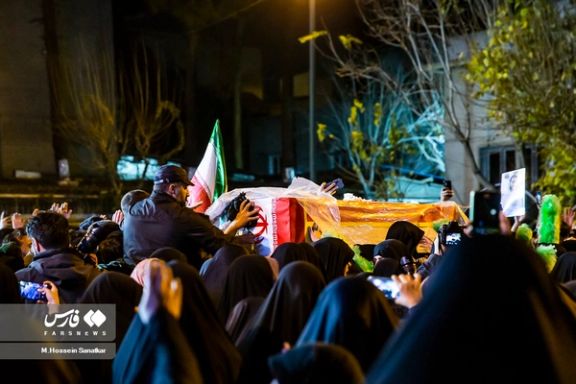
The Commander of Iran's Islamic Revolutionary Guard Corps (IRGC) has vowed revenge for the killing of IRGC commander Razi Mousavi in Syria.
Mousavi was targeted in an alleged Israeli airstrike earlier this week amid the shadow war between the two countries, with his body subsequently brought to Tehran for burial.
Amidst the Gaza war, which commenced on October 7 with Hamas leading the conflict against Israel, Iran-backed militias in Syria, Iraq, Yemen, and Lebanon have also become involved.
In a televised speech, Hossein Salami declared that the retaliation for Mousavi's death would extend beyond conventional measures.
"Our revenge for the martyrdom of Sayyed Razi will be nothing less than the removal of the Zionist regime," Salami said, claiming that he had defended the Muslim nation for almost 33 years.
Mousavi played a pivotal role within the IRGC, known as the IRGC's man in Syria. Thousands of mourners gathered in Tehran's central Imam Hossein Square for Mousavi's funeral, passionately chanting anti-Israel and anti-American slogans. The crowd waved yellow flags bearing the message "I am your opponent," directly targeting Israel.
During the funeral on Thursday, Iran's Supreme Leader, Ali Khamenei, led prayers and paid tribute to Mousavi.
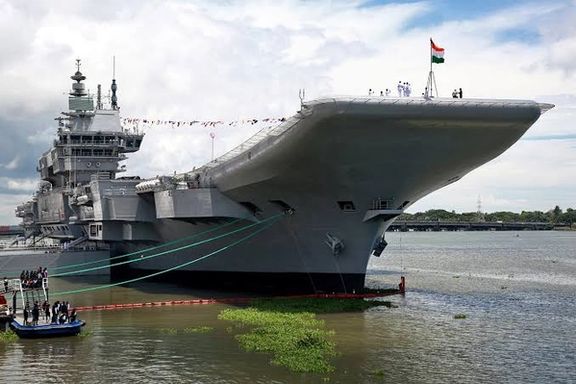
Officials in New Delhi have pledged to hold accountable those responsible for the recent attacks on two merchant vessels predominantly crewed by Indians.
The commitment comes in the midst of ongoing missile and drone strikes in the Red Sea, attributed to Houthi rebels and Iran.
India's response to the incidents in the Red and Arabian Seas, particularly the attacks on MV Sai Baba and MV Chem Pluto follows the incident on the MV Chem Pluto which was targeted by a one-way attack drone a mere 200 nautical miles off the Indian coast. While the Pentagon attributes the attack to Iran, deviating from the majority of strikes originating in Yemen, India has refrained from officially naming the perpetrator.
During the commissioning ceremony of INS Imphal (D68), the third destroyer in the Indian Navy's Visakhapatnam class, Raksha Mantri Shri Rajnath Singh, India's Defense Minister, declared a commitment to retaliatory measures. "Those who have carried out these attacks, we will find them from the bottom of the sea, and strict action will be taken against them," stated Shri Rajnath Singh.
The defense minister emphasized India's role as the "Net Security Provider in the entire Indian Ocean Region" and its commitment to keeping sea lanes open to facilitate expanded regional trade in collaboration with international partners. Singh also attributed the attacks to India's "growing economic and strategic power," suggesting that it has fueled "jealousy and animosity" in certain quarters.
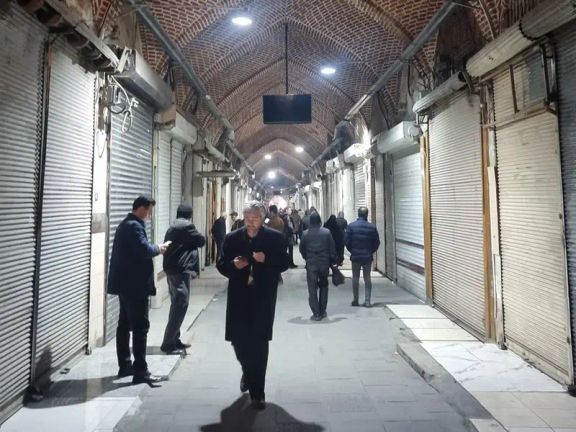
Talks between government representatives and security agencies aimed at resolving the ongoing strike by gold retailers in Tehran have failed to find a solution.
As of Wednesday, the widespread strike has entered its fifth day, with gold shops remaining closed in key cities such as Tehran, Mashhad, Karaj and Tabriz, protesting the government's tax policies affecting the gold sector.
Last week, the Tax Affairs Organization issued a statement warning about the obligation for gold jewelers to issue electronic invoices in a comprehensive system.
Subsequent to the announcement, news of a purported 25% tax on gold and jewelry sales circulated but was promptly denied.
After almost a week of strikes and protests, Ehsan Khandouzi, the Minister of Economy, labeled reactions to the government's new tax policies in the gold sector as "false news" and promised resolution in the coming days.
On Tuesday, information reached Iran International revealing that security agencies in Tehran are urging the reopening of gold trade units. However, market activists remain resolute in their determination to continue the strike until the end of the week.
Yusef Taqizadeh, the head of the Gold and Jewelry Union in Mashhad, reported on Tuesday that the government has temporarily reversed its decision to register the information of gold sellers and buyers in the comprehensive trade system. In response, Taqizadeh called for the cancellation of the strike in Mashhad and the reopening of gold shops by the shopkeepers.